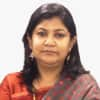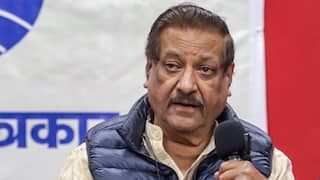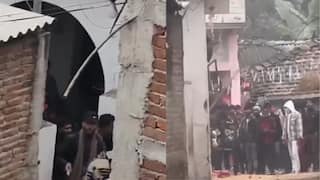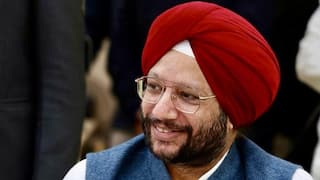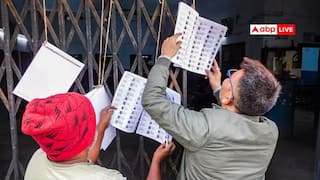Solution Can't Be Found On Battlefield, PM Modi Tells Putin In Moscow
Amid sharp criticism from Ukraine and concerns from the US, PM Narendra Modi tells President Vladimir Putin India’s purchase of Russian oil 'stabilised' the crude market.

India-Russia Summit: After telling Vladimir Putin in 2022 in Uzbekistan that “this is not an era of war” even as the Russia-Ukraine war raged on, Prime Minister Narendra Modi Tuesday told the Russian President Tuesday in Moscow that a “solution cannot be found on the battlefield” when it comes to resolving the ongoing conflict.
Modi told this to Putin during the India-Russia Annual Leaders’ Summit that took place after a gap of three years. This year it was Moscow's turn to host the meeting.
The Summit took place in the backdrop of missile attacks on Ukraine’s largest children's hospital, after Russia fired a barrage of missiles on the country. Ukraine alleged that a Russian hypersonic missile struck the hospital killing 37 people, out of whom three were children.
“The whole world seems to be only focussing on my visit to Moscow and trying to find out the meaning of every minute details of the trip… I am glad we could discuss Ukraine with an open mind, discussing their own perspectives on the issue and like true friends we spent four-five hours last evening,” Modi told Putin as the India-Russia Annual Summit began in the Kremlin Palace.
Modi was referring to the private dinner meeting he had with Putin on Monday at the Novo-Ogaryovo state residence near Moscow.
During the delegation level talks, Modi also said, “Be it war or terrorism, anyone who believes in humanity experiences immense pain when people get killed, especially innocent children. That pain can become dangerous. We did discuss that too.”
“As a friend I have always told you that for a brighter future of India-Russia ties, peace is important. I also know that solutions cannot be found on the battlefield. No solution or dialogue can be successful amidst bombs, guns and bullets. We need to resort to dialogue for having lasting peace,” Modi added as Putin looked on.
In 2022, when Modi met Putin on the sidelines of the Shanghai Cooperation Organisation (SCO) Summit in Samarkand, Uzbekistan, the Indian PM had told the Russian President that “This is not an era of war.”
During this face-to-face meeting, Modi told Putin that India is ready to play “any role expected” of New Delhi to bring peace.
“I need to assure you and I need to assure the world that India is in favour of peace and I am hopeful that my friend Putin is able to understand and work towards that,” he said.
According to official sources, India had also informed Russia that New Delhi has always called for respecting the UN Charter, including territorial integrity and sovereignty and dialogue and diplomacy is the only way forward.
This also found mention in the India-Russia joint statement, which said that both sides highlighted the “imperative of peaceful resolution of the conflict around Ukraine through dialogue and diplomacy including engagement between both parties.”
“They noted with appreciation relevant proposals of mediation and good offices aimed at peaceful resolution of the conflict in accordance with international law and on the basis of the UN Charter in its entirety and totality,” it said.
Compared to the last India-Russia held in December 2021 that witnessed the issuance of the 99-page joint statement, this time the leaders signed on to a 81-page document.
Modi’s visit to Moscow happened close on the heels of a recently concluded visit by Prime Minister of Hungary Viktor Orban, which also came under severe criticism from the West and Ukraine.
Meanwhile, Ukraine President Vladimir Zelenskyy severely criticised Modi’s gesture of hugging Putin and said that was a “devastating blow to peace efforts.”
“It is a huge disappointment and a devastating blow to peace efforts to see the leader of the world's largest democracy hug the world's most bloody criminal in Moscow on such a day,” he said.
Roadmap For Enhancing Two-Way Trade To $100 Bn By 2030
During the meeting, both sides also sought to lay down a roadmap for economic cooperation between both countries till 2030, which set a target of $100 billion worth of bilateral trade by 2030. Currently, two-way trade between India and Russia is worth $65 billion.
For this, both sides agreed to eliminate all kinds of non-tariff barriers on the merchandise goods traded between both sides by way of liberalization of bilateral trade, including the possibility of the establishment of the Eurasian Economic Union (EAEU)-India Free Trade Area.
In order to address the rising trade deficit which is in favour of Russia, it was decided that Moscow will import more goods from New Delhi “to achieve balanced bilateral trade.”
Both sides also decided to increase cargo turnover with India through the launch of new routes of the North-South International Transport Corridor, the Northern Sea Route and the Chennai-Vladivostok Sea Line.
During the meeting Modi made it clear to Putin that India will seek to increase its oil purchases from Russia from what it is now. New Delhi is the biggest buyer of Russian oil even as India ramped up the purchases since February 2022 when the Ukraine war began and Moscow came under stringent economic sanctions.
According to Foreign Secretary Vinay Kwatra, India might sign onto new deals with Russian oil major Rosneft.
Modi was also officially conferred the 'Order of St Andrew the Apostle' award by the Russian President in a special ceremony in St. Andrew Hall in the Kremlin for his contribution to fostering bilateral ties between the two countries.
Related Video
Uttarakhand News: Winter Chill Grips North India; Kedarnath Dham Covered in Snow






